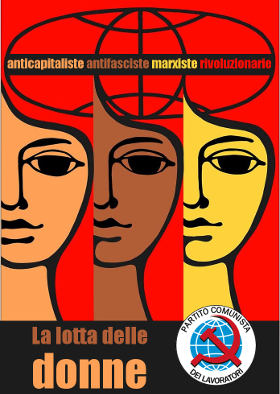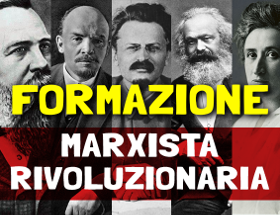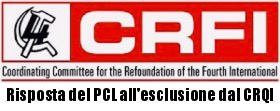Internazionale
The inter-imperialist trade war
The test of protectionism for Trump. The independent interest of the international working class
7 Aprile 2025
The great revival of protectionism distinguishes Donald Trump's new direction. The use of protectionist policies is of course not new, even in recent times. Since the Great crisis of 2008, and particularly in the last decade, the raising of tariffs on import has become a widespread tool in the competition between imperialist powers. This happened even in the USA, where tariffs were first introduced by the first Trump administration and then largely retained, not surprisingly, by the Biden administration. What is new today is the relaunch of the protectionist weapon on a large scale, and the political significance it takes.
The protectionist measures launched by Trump on the so-called 'America's Liberation Day' (April 2nd) shall apply to great part of productive sectors across the world. Their distribution follows not only an economic but also a political standard. China is hit hardest, along with a large part of the Asian markets; European exports follow closely behind; Russia is the only country spared. It is a reflection of the opening to Russian imperialism with the aim of separating it from Chinese imperialism. It shows the acknowledgment of Russia as a global negotiator, at the expense of European imperialist countries, and confirms China as the strategic rival of the USA.
THE ECONOMIC AIMS OF TRUMP'S TURN
On an economic level, Trump's new protectionist turn pursues a combination of different and complementary aims.
The first one is to readjust the trade balance, and thus the US balance of payments. The measure of the new tariffs on the basis of the tariffs imposed by rival capitalist countries (with a halved retaliation as proof of Trump's alleged 'generosity') is arbitrary from an economic point of view, because it entirely attributes the responsibility for the American trade imbalance to the tariffs suffered, but it is very clear in its purpose – impose on competing capitalist countries the cost of their intrusion, to protect the USA.
The second aim is to bring back to the US investments and industrial production that was re-located to Asia and Europe during the years of the great expansion of capitalist globalisation. 'Make America great again' means first of all to restate its role as leading industrial power. The clear message to all capitalists around the world consists in imposing high tariffs on Asian and European export countries and at the same time promising a further reduction of taxation on profits for those who invest in the US. The message is – if you want to avoid the axe of tariffs, and in addition want to make profits, you have to come or go back to manufacturing in America. The Golden Age will be yours above all.
The third aim is to push internationally to buy US government debt. Possibly buying very long-dated, even 100-year debt (the so-called 'Matusalem bonds'). The American debt to the rest of the world has peaked 23 trillion dollars. A gigantic amount. Its exponential growth over the last twenty-five years (from 50% of GDP in 2000 to 125% today) is potentially a landmine for US imperialism, and must be kept under control. Do you want to avoid the axe of tariffs on your products? Buy US government bonds for eternity, without expecting to see them paid back with interest. Trump demands «phenomenal offers» to reduce his tariffs with indulgence.
THE REACTION OF RIVAL IMPERIALIST POWERS.
THE EFFECTS ON THE WORLD ECONOMY
The goals are clear, and moreover openly declared. They follow the logic of 'America First'. But their outcomes are entirely hypothetical, because they are exposed to two unpredictable variables – the dynamics of the inter-imperialist negotiation and the world economy.
The other imperialist powers seem to react in different ways. European imperialist powers fear serious consequences for the EU – having to handle at the same time with the trade war, with their marginalisation from the Ukrainian negotiations, with the announced US disengagement from the Europe, and with their new rearmament.
European rules provide that in trade relations the negotiating power lies with the European Commission, not with national governments. But this brings on the EU the contradictions among different national interests, between those who are most exposed in the US market and those who are least, between those who are most exposed in one commercial area and those in another, between those who want to lead European retaliatory tariffs (France) and those who are looking for for a privileged relationship with Trump (Italy). In any case, the strong growth of international trade in the eurozone's GDP (from 31% in 1999 to 55% today) shows Europe's increased exposure to trade war. The economy of transatlantic relations amounts to 33% of world GDP. So the watchword in Brussels is to look for other export markets, such as Mercosur and Mexico.
China, on the other hand, replied to the US with an immediate and substantial retaliation. A forced reaction by the main rival great power. Chinese imperialism seeks to gain a political advantage from the US turn, trying to offer itself to European imperialist powers and even Japan as a reliable trader and as a guardian of WTO rules. We can see it from the meeting between the foreign ministers of China, Japan, and South Korea to discuss their trade relations. And we can see it from the smoke signals between China and the European Union. The EU is terrified by the risk of an invasion of cheap Chinese goods on its markets as a consequence of US protectionism, but at the same time is interested in strengthening its negotiating power with the US.
In inter-imperialist relations, the traditional 'war of position' seems to give way to a 'war of movement'.
The opening of a trade war deployed under the banner of protectionism may have a strong impact on the world economy. The global market is the sum of national and continental markets. If each country or imperialist bloc protects its market with higher tariff barriers against rival capitalist countries, the inevitable result will be a contraction of the world market. It is no coincidence that the issue of a possible world recession has become matter of international discussion, as shown by the turmoil of world stock exchanges. The repeated plunges and the relevant drop in oil price are revealing symptoms of the great fear of a recession.
THE UNKNOWN OF TRUMP'S HOLD ON HIS SOCIAL BLOC, AND ITS IMPLICATIONS FOR WORLD POLITICS
Within the US, the social base of Trump's power will be tested by the effects of protectionism. Unlike Europe (and all the more so in Italy), in the US investment in stock market shares involves a large sector of labour aristocracy and middle class, an important sector of Trumpism's social base. It is for this reason that Trump was quick to reassure his costituency about the future miraculous effects of the protectionist measures. What is certain is that the rhetorical appeal of his announcements will have to confront the hard materiality of the people's wallets. The American big business, gathered around Trump, is showing signs of nervousness.
What is certain is that Trump's resilience at home will be decisive for the very credibility of his foreign policy. And not only on the economic side. The political-strategic goal of separate Russia from China depends on Trumpism's domestic stability. Indeed, China's own institutional political stability is far superior to that of Trump, who will have to face the difficult mid-term elections in two years. The Putin regime is flattered and tempted by the American offer of a world role as a great power, but it can only consider changing horse for a reliable political guarantee, which means, again, Trump's stability. Is it by coincidence that Trump has started alluding to his possible (but unlikely) third term, ruled out by the US Constitution?
FOR THE INDEPENDENT INTEREST OF THE INTERNATIONAL WORKING CLASS
Protectionism has and will have, as always, an ideological implication. Each country and/or imperialist bloc will seek to enlist the wage earners in its own trade war against rival imperialist powers. Trump is calling for the support of the American working class against the European «parasites» who have swindled America. European imperialist countries will seek the backing of their own workers to the retaliation against the 'irresponsible' US administration. Chinese imperialism will strengthen its nationalist appeal in support of the protectionist anti-US measures. Everywhere, attempts will be made to pit workers against other workers in the name of the interests of their own imperialist nation, or camp.
But the international working class has no interest in being enlisted in trade wars between the capitalists and their states. On the contrary, it has an interest in fighting for its own independent interests and for a social alternative.
Protectionism will have social consequences for the working class. It will lead everywhere to rise in prices and thus to undermine wages. It will lead to a widespread reorganisation of production chains, with job cuts and attack on trade union rights, a possible economic recession which will impact the workers.
The fight for the sliding scale of wages, the re-distribution of job through the sharp reduction of working hours, with equal pay, the nationalisation without compensation and under workers' control of companies closing its plants and laying off, all this can and must be the first unifying working class answer to the coming storm – in every country, on a continental scale, on a world scale.
If capitalists go to war against each other by taking 'their' wage earners as hostages, wage earners in return will stand up for their common interest, beyond any national division. The alternative to protectionism is not the unlikely return to the free trade of the lost globalisation. The alternative is the overthrow of capitalism, beyond all border divisions.
The task of revolutionary Marxists is to develop the political consciousness of this revolutionary truth, at every latitude of the world.










